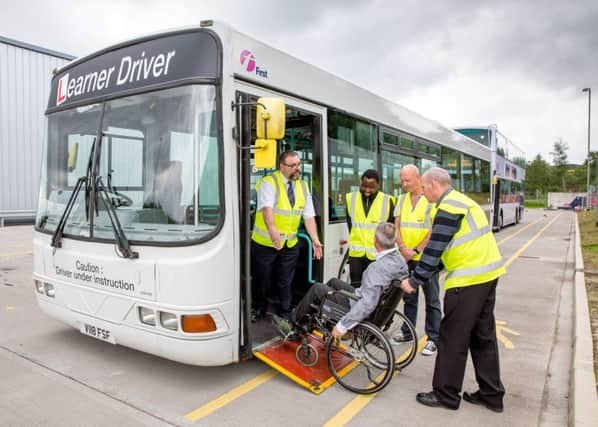Let's drive the future with better training


Organisations spend a great deal of time and resources recruiting, developing and training their staff to cope with the ever-increasing complexity of modern Logistics and issues such as the need for a better gender balance to strengthen the skills available to the sector. By historical standards, Scottish and UK levels of unemployment have remained relatively constant while shortages of skills persist in several sectors of Logistics and Transport.
One of the problems with travel demand is that it peaks by time of day, month and season. This is compounded with the increasing desire for “next day” and 24/7 services and shopping peaks created by events such as Black Friday and the Christmas season. However, there are year-round shortages of truck drivers, particularly for long distance work, and bus drivers in many parts of the country. The workforce is also ageing, with many bus and truck drivers over 50, or even 60, years of age. Shift patterns such as early starts or late night finishes can affect staff retention. Many years of tight margins have restrained the ability of companies to invest in a new, younger workforce and prospective employees in their twenties can find that taking up driving roles is not affordable due to the costs of obtaining HGV licences, which can cost thousands of pounds. Perhaps more could be done to assist people out of work to train for HGV Class 1 & 2 licences?
Advertisement
Hide AdAdvertisement
Hide AdMany bus and truck operators are focusing on improved training and development of their existing staff and measures to improve staff retention, such as improvements in terms and conditions and pensions. but more needs to be done.


As an example, First Bus have a dedicated Training Academy at Livingston supplemented by local training. Companies such as Clyde Marine play a leading role in merchant navy training, as does City of Glasgow College. Better public transport to industrial sites would help support the various shift patterns. Managing supply chains and transport services requires a wide range of skills, from marketing to driving, IT skills to vehicle maintenance so younger entrants are needed across the board.
The Government has laid down minimum standards for training and ongoing professional competence. In the road transport sector, drivers are required to carry out a minimum level of training each year in order to retain their heavy goods licence. This can include first aid training, fuel-efficient driving and a wide range of other topics. In Scotland there are many drivers who require additional qualifications to carry “dangerous goods” which include most types of whisky, spirits and a wide range of oil products. Regular refreshers are required to retain these licences.
As the leading professional body for the transport industry, the Chartered Institute of Logistics and Transport (CILT) has been supporting changing training needs with training in new technology skills. CILT also carries out regular surveys on skill shortages in the industry and regularly reports more than 70 per cent of UK and International transport operators experiencing skills shortages. Plus, CILT helps members to develop their skills on a one-to-one basis through its mentor programme.
Logistics companies deal with these driver shortages in a number of ways.


Some supermarkets use rail for the medium and long-haul journeys within the UK and move the bulk of their goods from the Midlands and the southern ports to Central Scotland by rail in long trains, each of which can replace 30-40 road movements. There are also regular trains from central Scotland to Aberdeen and Inverness. Longer trucks and larger containers are being brought into use by the major logistics companies and are expected to become commonplace in the near future. New rail wagons capable of carrying larger payloads are being used from the Tarmac cement works at Dunbar.
In the Logistics sector, colleges and universities offer a variety of courses to equip younger candidates for a career, coupled with in-company training and work experience. Many leading companies have a presence in Scotland, often with global connections. CILT offer a range of courses and professional qualifications to help candidates at all levels develop their careers, with special focus on apprentices and young professionals.
Currently there are many people working in Logistics and Transport in Scotland from across the EU and beyond, as well as many UK nationals working worldwide. It is a global industry with a diverse range of talent, but perhaps not as well known as it could be school leavers and college/university graduates. The UK has always been a trading nation and needs to find the correct balance between training and developing local talent while welcoming skilled candidates from other countries. This challenge may now be in sharper focus since the EU referendum.
Advertisement
Hide AdAdvertisement
Hide AdTransport and Logistics staff have learned to become flexible and adaptable, but the industry is changing. From working in a warehouse to planning the programming of robotics, the sector has jobs to suit all people and is facing a skills shortage. CILT will continue to do what it can to help train a new generation of employees.
Douglas Norris, National Office for Scotland CILT